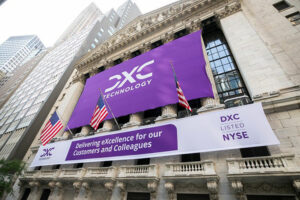US INFORMATION TECHNOLOGY (IT) service provider DXC Technology is looking to help position the Philippines as a global IT hub with its recently opened client experience center, through which it plans to help both local and foreign clients in their artificial intelligence (AI) and cloud-adoption journeys.
“We don’t just want the Philippines to be known as a delivery location, but we want to be known as a location that is able to help our clients innovate,” DXC Philippines Site Leader Malou Ocampo-Quiambao told BusinessWorld during a tour of the center in Taguig City on Nov. 6.
“In this age, everything needs to be AI-first and AI-enabled. So, that’s how we also want to shift so that it provides more value not just for local clients but for global clients as well.”
DXC opened its first client experience center in Taguig City on Nov. 3.
The center, located on the 12th floor of the International Property Center within McKinley Hill Cyberpark, is expected to support DXC’s clients across America, Europe and Asia.
The company is optimistic about further boosting its presence in the Philippine market as more firms adopt AI, cybersecurity and cloud-migration journeys, said DXC Philippines Country General Manager Maria Angelica Yap.
In the Philippines, DXC supports clients in industries like manufacturing, utilities, consumer and retail, public sector, banking and automotive.
“We actually support quite a number of banking customers from the global center, delivered out of the global center for a global company. So, we want to kind of replicate that as well in the Philippine market,” Ms. Yap said.
Ms. Yap said the 250-seat client experience center near Bonifacio Global City is accessible to offices within the area. It is also near the Ninoy Aquino International Airport, she said, making it convenient for out-of-town and foreign clients.
The client experience center is envisioned to become a co-creation hub to help global and local clients run their mission-critical applications and modernize their cloud, data, AI and cybersecurity systems.
Ms. Quiambao said DXC’s client experience center has spaces that can be reconfigured for training, town hall meetings and workshops.
“Where you have those types of spaces, it really encourages or triggers ideas from people when they do those types of brainstorming,” she said.
DXC’s client experience center will also help upskill its 7,000 employees to become AI-ready.
“[An AI-enabled workforce] is not just a nice-to-have. It’s now a must-have,” Ms. Quiambao said.
“The experience center gives them the ability to be able to work with other people, see how they’re doing and learn from them,” she added.
The center also gives DXC a space to collaborate with universities and professional organizations to ensure that the country’s workforce aligns with industry demand.
It would also allow the company to better assist Filipino clients in keeping up with the fast-moving tech landscape, address skill gaps and comply with data sovereignty laws, Ms. Yap added.
“It’s really meant for clients and DXC to work together, think about what the requirements are, what frameworks can we do, and what roadmaps can we embark on to get them to that journey,” she said.
The IT-BPM industry is expected to increase its staffing to 1.9 million this year, generating $40 billion in export revenue, according to the Information Technology and Business Process Association of the Philippines. — Beatriz Marie D. Cruz

